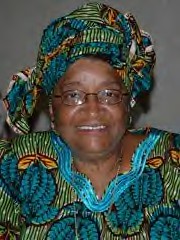
Ellen Johnson-Sirleaf, President of the Republic of Liberia. The west African nation has been a focal point in the international traffic of illegal diamonds.
Originally uploaded by Pan-African News Wire Photo File
LIBERIA'S SIRLEAF SEEKS SECOND TERM AS PRESIDENT
Liberian President Ellen Johnson Sirleaf, Africa's first woman
president, has announced she will run for re-election next year,
despite previously promising to serve only one term.
"I now announce to you, and to the thousands of supporters in
radio land and abroad, that I will be a candidate," she said during
her annual address to parliament on Monday, which received sharp
criticism from opposition parties.
Government spokesman Cyrus Badio told state radio on Tuesday
that Sirleaf's decision was due to her successes as president,
after her election in 2005 in the wake of a brutal civil war.
"The president has decided to go for a second round because of
the numerous successes she has realised over the years in power.
She has significantly changed the lives of Liberians," said Badio.
Sirleaf's candidature comes despite a report by Liberia's
Truth and Reconciliation Commission naming her among some 50 people who it recommended be banned from holding public office for 30 years for supporting warring factions during the civil war.
In her address to parliament, Sirleaf proposed amendments to the
national human rights commission act to enable a commission to work alongside the justice ministry to "determine those recommendations that are implementable ... under the constitution and laws of our nation."
The announcement prompted a storm of criticism from the
opposition.
Opposition Liberty Party chairman Israel Icinsiah said Sirleaf's
decision was a signal to voters that she would renege on her
election pledges.
"This is the clear indication that she does not do what she
says," he said.
Congress for Democratic Change chairperson Geraldine Doe told
AFP that the annual address to parliament was "was not the right
forum for such a statement."
"You invite diplomats and other dignitaries to such an important
event, and you bring cheering squads for a political statement that
has nothing to do with what we came here for. It is wrong," she
said.
In August last year, US Secretary of State Hillary Clinton threw
her support behind Sirleaf during an official visit, praising her
post-war transformation of Liberia.
Founded by freed US slaves in the 19th century, Liberia remains
friendly with the United States and Sirleaf has generally enjoyed
strong support overseas.
Badio, the government spokesman, said Sirleaf could be proud of
her record as president.
"She has reinstalled water and electricity in the capital and
some parts of the rural parts of Liberia. She has rebuilt the
infrastructure that was destroyed during the war."
The west African nation was ravaged by successive civil wars in
which some 250,000 people died between 1989 and 2003, leaving the infrastructure ruined and the economy in tatters.
Supplies of water and electricity in the capital are still
haphazard and unemployment and illiteracy in the west African state
are high.
The panel investigating Liberia's civil wars included Sirleaf's
name in a list of people it accused of being "the financiers and
political leaders of the different warring factions".
Sirleaf denied ever being a member of the movement led by rebel
leader and warlord Charles Taylor.
She told the truth panel she had met Taylor several times during
Liberia's successive conflicts and had also collected funds for him
in the 1980s.
Taylor is on trial in The Hague on 11 counts of war crimes and
crimes against humanity stemming from his support of Revolutionary
United Front guerrillas in neighbouring Sierra Leone's 1991-2001
civil war.
No comments:
Post a Comment